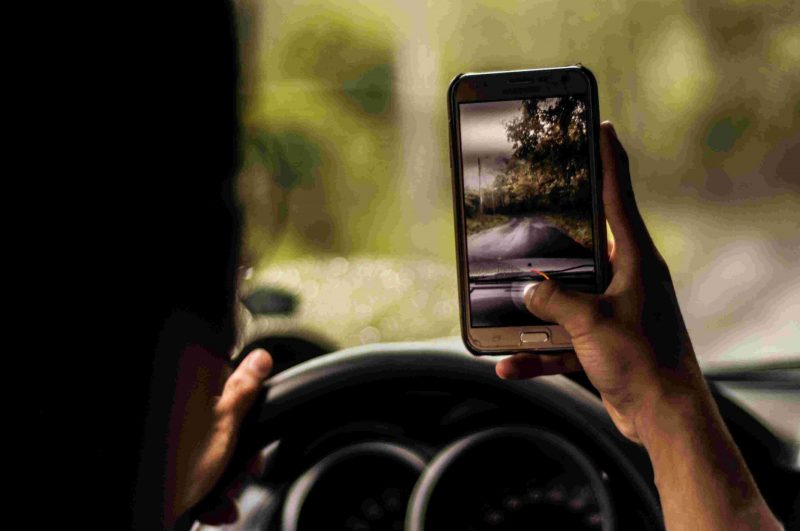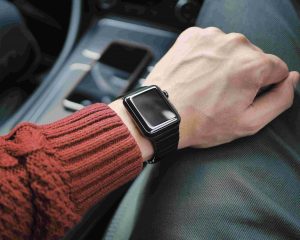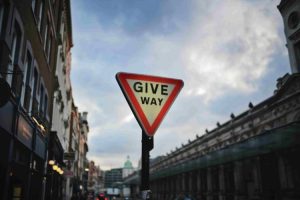
Even as an experienced driver, you may not have realised how many things are illegal to do while driving. After all, motoring offences and laws in the UK can change quickly, and in 2022 a new set of laws and regulations were announced leaving many drivers feeling anxious. So, what is illegal to do while driving? And, what do you need to do to avoid a potential driving ban? Let’s go through 34 things to remember, starting with the latest regulations.
What are illegal things to do while driving? New for 2022:
- Selecting a new song on your music playlist
New driving laws make it illegal to touch your phone while driving, which includes using your phone to scroll through playlists. You could be charged £200 for committing this offence, and given a six point penalty on your licence, even when you’re in stationary traffic or parked with the engine running.
- Using your phone as a SatNav in an unfixed position
Nowadays, most of us rely on the SatNav in our phone to direct us when we’re driving. In order to do this safely and legally, your phone must be in a fixed position on your dashboard or your windscreen. This should enable you to see the SatNav directions clearly while you’re driving, without you needing to hold your phone. Bear in mind that the ‘cradle’ your phone is in should not block your ability to clearly see out of your windscreen. If you’re caught holding your phone while behind the wheel, you could be fined £200 and given six points on your licence. If you’ve had your licence for less than two years, you could receive a driving ban.
- Failing to give pedestrians priority at junctions
In early 2022, The Highway Code announced the new ‘hierarchy of road users’, placing the greatest road responsibility on users who pose the greatest risk to others. The new hierarchy looks like this:
- Pedestrians
2. Cyclists
3. Horse riders
4. Motorcyclists
5. Cars and Taxis
6. Vans and Minibuses
7. Large passenger vehicles and HGVs
This means drivers need to give priority to pedestrians who are waiting to cross at a junction and should observe the correct positioning when sharing the road with other users.
- Cutting across cyclists
With the new hierarchy of road users, drivers have a greater responsibility to protect cyclists. The Highway Code now states that drivers “should not cut across cyclists going ahead when turning into or out of a junction or lane, just as you would not turn across the path of another motor vehicle”. If you turn at a junction and you cause a cyclist to stop or swerve, the driver would be held responsible if this led to an accident.
- Checking your smartwatch
In a recent study, 43% of drivers admitted to using their smartphone behind the wheel, with 18% of drivers admitting to reading messages, 14% admitting to replying to messages and 14% admitting to skipping music tracks. Despite this, using your smartwatch while you’re driving will soon be a punishable offence. Although wearing one while you drive is not a crime, checking for notifications or reading texts on your smartwatch can constitute as careless or distracted driving. You could be handed an £100 on-the-spot fine and three points on your licence.

More illegal things to do while driving:
- Undertaking
Undertaking on a motorway describes when one vehicle overtakes another by using the left-hand lane. It is advised against in The Highway Code’s guidance on overtaking, unless conditions are congested and “traffic in left-hand lanes may sometimes be moving faster than traffic to the right”. Undertaking can be a cause for inconsiderate or dangerous driving as it can confuse and startle other drivers, potentially leading to an accident. It classifies as improper lane discipline, which is one of the most common driving offences.
- Driving too close to another vehicle
If you are driving too close to the vehicle in front of you, a practice known as tailgating, you can be charged with a careless driving offence. You can end up with a £100 penalty charge and three points on your licence.
- Driving while on certain prescription drugs
It is illegal to drive if you have taken certain medications (including prescription drugs) because the side effects can impair your driving. If you have been prescribed any of these drugs listed by the Government, you must ask your doctor if you should drive while taking the medication before you get behind the wheel. The police can stop and assess you if they think you’re drug driving. If they believe you’re unfit to drive because you’re on drugs, you’ll be arrested and you will have to take a blood or urine test at a police station. You face a minimum one year driving ban, an unlimited fine, up to six months in prison and a criminal record if you’re convicted of drug driving.
- Eating or drinking at the wheel
While eating and drinking are not technically illegal things to do while driving, it can still land you with a fine and points on your licence. If police believe that eating or drinking behind the wheel has caused you to become distracted and lose control of your vehicle, you could be fined for distracted or careless driving.
- Smoking
Smoking while driving isn’t an offence in itself, but if it distracts you from the road, it can be used to show careless or dangerous driving. You should also note that The Children and Families Act 2014 makes it illegal to smoke in cars with a passenger who’s a minor. So, if you’re smoking or failing to prevent someone else in your car from smoking, and you have under 18s in your vehicle, you’re breaking the law.
- Splashing a pedestrian with a puddle
According to the Road Traffic Act 1988, it’s an offence to splash a pedestrian while you’re driving. In the eyes of the law, splashing a pedestrian is considered driving “without reasonable consideration for other persons”. If you’re found guilty of deliberately driving through puddles or splashing pedestrians due to impatient, selfish or aggressive driving, you could be fined up to £5000 and handed up to nine penalty points on your licence.
- Driving with a hangover
In England, Wales and Northern Ireland, it is illegal to drive with over 80 milligrams of alcohol per 100 millilitres of blood. In Scotland, this maximum limit drops to 50 milligrams of alcohol per 100 millilitres of blood. If you spend an evening drinking and plan to get behind the wheel the following morning, you’re still at risk of driving with too much alcohol in your system. This is because alcohol takes time to leave your body. Drink driving offences depend on the severity of the offence, however you can face up to six months in prison, an unlimited fine, a driving ban, and a criminal record. Plus, side effects of a hangover, such as tiredness or nausea, can easily lead to careless driving.
- Using your phone at a drive-thru
The number of drive-thrus in the UK is clearly growing, with demand for drive-thrus increasing by 25% in 2021, post-lockdown. Our reliance on paying for goods and services with our smartphones has increased, too. But can you use your phone to pay for a drive-thru meal? No – unless your vehicle is stationary, the handbrake is on, and the engine is off. Otherwise, you could be fined £200 and handed six points on your licence.
- Driving with a dirty windscreen
The Highway Code clearly states that “windscreens and windows must be kept clean and free from obstructions to vision”. As a driver, vehicle maintenance is your responsibility, and if your vision is obscured due to a dirty windscreen, you’re in breach of Regulation 30 of the Road Vehicles (Construction and Use) Regulations 1986.
- Driving with a dirty numberplate
Your vehicle’s numberplate must be clearly readable while you’re driving. Driving in the UK, especially in the winter and in the countryside, can easily lead to a mucky numberplate. But remember, if your numberplate is so dirty that it cannot be easily read, you risk an £1000 fine.
- Driving too slowly
Although it’s uncommon, you can find roads in the UK that have minimum speed limits. The start of a minimum speed limit zone is indicated by a blue, circular road sign with a white number on the front. The end of the zone is indicated by the same sign but with a red line through the number. Driving slower than the minimum speed limit is dangerous and can result in a fine. But what about other major roads and motorways? Even when there is no legal minimum speed limit, driving too slowly can still be considered hazardous as other road users would find it unexpected. This type of inconsiderate driving can land you with an £100 fine and three points on your licence.
- Driving without declaring medical conditions to the DVLA
If you have a worsening or new medical condition that may impact your ability to drive safely, you must inform the DVLA. Notifiable conditions can include: diabetes, syncope (fainting), heart conditions, sleep apnoea, epilepsy, strokes and glaucoma. If you do not inform the DVLA, you could be fined up to £1000 and, if you are involved in an accident, you could be prosecuted.
- Misusing the hard shoulder
Misusing the hard shoulder is an illegal thing to do while driving on the motorway. By committing this offence, you can be fined up to £100 and given three points on your licence. You can only use the hard shoulder if your car breaks down or if the hard shoulder is opened as a lane on a smart motorway – there will be clear signs to indicate this.
- Overtaking dangerously
Overtaking is a driving manoeuvre that you can get wrong, if you’re not cautious. For example, if you don’t have enough space, need to exceed the speed limit, or have poor visibility of the road due to unfavourable weather conditions, then you should not overtake the vehicle ahead. Essentially, if you overtake another vehicle in an unsafe manner, you could be charged for dangerous driving. The maximum penalty for dangerous driving is 2 years imprisonment, an unlimited fine and an obligatory disqualification.
- Ignoring road signs
It’s illegal to ignore road signs while you’re driving, as long as the road sign is legally positioned. You could be given a fixed penalty of three points on your licence and a £100 fine.

- Driving with snow on your car
If you set off on a journey, no matter how short, with snow piled up on your vehicle, you’re at risk of being fined. The snow could easily fall onto your windscreen and obstruct your view of the road – this would be a breach of The Road Traffic Act 1988. Plus, if the snow falls onto or into the path of another vehicle on the road, it could be a case for inconsiderate driving.
- Middle lane hogging
Middle lane hogging describes when a vehicle stays in the middle lane of a motorway longer than is necessary. It is classified as a careless driving offence, and you could be handed an £100 fine and three points on your driving licence.
- Supervising a learner driver without enough experience yourself
It’s standard practice in the UK for learner drivers to gain some driving experience with a family member or friend. However, certain rules need to be followed before you can supervise a learner legally.
- Firstly, you must be over 21 years old.
- Secondly, you must be qualified to drive the type of vehicle (e.g. manual) the learner is driving.
- Thirdly, you must have had your full driving licence for at least 3 years, and this has to be from the UK, the EU, Switzerland, Norway, Iceland or Liechtenstein.
Learner drivers receiving un-paid lessons from somebody who doesn’t meet this criteria can be fined up to £1000 and handed six points on their provisional licence.
- Using your phone while supervising a learner
Even if you aren’t actually behind the wheel, if you’re a driver supervising a learner driver, you must not use your phone in the car. In the eyes of the law, as a supervisor, you are ultimately responsible for the vehicle. If you touch your phone while supervising a learner, you could be given a £200 on-the-spot fine and six penalty points on your licence.
- Adjusting your seat
It’s important to have your seat in the right position while you’re driving. However, if you feel the need to make adjustments after you’ve set off on your journey, you should stop somewhere safe before moving your chair. To the authorities, moving your seat while driving could be considered a form of careless driving and, consequently, a cause for a fine if you wind up in an accident.
- Flashing your headlights to give way
Although it may seem harmless, flashing your headlights to give way to another vehicle is technically illegal. You should only flash your headlights to warn another vehicle of your presence. According to Rule 110 of The Highway Code, you must not flash your headlights for any other reason or to intimidate other road users. If an accident were to occur, you could be held liable.
- Throwing litter out of your window
Whether it’s a biodegradable apple core, a cigarette butt or an empty takeaway bag, throwing any litter out of your vehicle is an illegal thing to do while driving. By leaving litter, you break Section 87 of the Environmental Protection Act 1990. Plus, according to Rule 147 of The Highway Code, littering out of your vehicle puts other drivers, motorcyclists and cyclists at risk. If you – or your passengers – are caught, you could face a £60 fine.
- Driving over a mini-roundabout
It is illegal to drive over the centre of a mini-roundabout. According to The Highway Code’s guidance on using roundabouts, “all vehicles must pass round the central markings except large vehicles which are physically incapable of doing so”.

- Driving with the music blasting too loud
Everybody enjoys listening to some music while they drive, however The Highway Code highlights that driving with your music playing too loudly can lead to distracted driving. While there’s no legal limit for the maximum volume your music should be played at, if an incident was to occur, you could be penalised for distracted driving. With blaring music, it’s harder for you to hear other important sounds on the road, such as horns from other vehicles, level crossing signals, and emergency service sirens.
- Being distracted by your passengers
Just like listening to blaring music, if your passengers are distracting you while you’re driving, this could be classified as distracted driving. Remember that the police can stop you at any time if they feel you are driving distracted, and therefore not in full control of your vehicle.
- Passing through a red light
It’s illegal for any part of your vehicle to cross the white stop line if a traffic light has turned red. If your car is captured by a traffic light camera, you’ll be asked to pay a fixed penalty £100 fine and be handed three points on your licence.
- Making way for an emergency vehicle in an unsafe manner
In the UK, drivers are expected stay alert for emergency vehicles with flashing blue, red or green lights and sirens or flashing headlights. It’s important for drivers to calmly make way for the vehicle, but only if it’s safe to do so. If you endanger yourself or others by making way for an emergency vehicle, you could be penalised with a dangerous driving charge.

- Using your horn in anger
According to Rule 112 of The Highway Code, you must not use your horn aggressively. This could land you with a fixed penalty notice of £30. You should only use your horn when your vehicle is moving and to warn other road users of your presence.
- Using your horn in a built-up area
When driving, it’s illegal to use your horn in a built-up area between 11.30pm and 07.00am, unless another road user poses a danger. Just as using your horn aggressively, using your horn in this scenario could result in a £30 fixed penalty notice.
We hope you are now feeling more confident about what is and isn’t illegal to do while driving. If you are in need of expert motor legal advice, police station representation, or court representation, please contact the team at Newtons today.
